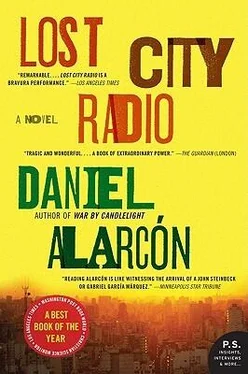In a few hours, the night breezes would blow, Manau would excuse himself, and wander off to look for Adela, forgetting Nico and his unfortunate father for another day. If the moon was out, or even if it wasn’t, he would invite her to swim.
Now Zahir was waiting, eyes shut tight, holding his arms out for inspection. Manau took another sip from his gourd and set it on the floor. He placed a hand over each stump, felt the rough skin against his palms. He held Zahir’s right arm by the wrist, and went over the wound with his thumb. Where it had scarred, the flesh turned in on itself, like a sinkhole or a crevasse or the dry and jagged bed of a stream.
“It’s been seven years,” Zahir said, opening his eyes. “Seven years today.”
Manau let go. He had come to think of his landlord’s stumps as a cruel birth defect, a trial Zahir had always borne. Of course, this wasn’t true. He knew it wasn’t. Still, it was startling: seven years ago yesterday, Zahir could scratch his temple, light his own cigarette. He could love his wife with ten more possibilities. Manau looked down at his own hands, and they seemed like miracles. He cracked his knuckles; they gave off a satisfying pop. He wiggled his fingers, then caught Zahir watching him.
“I’m sorry.”
“You get used to it. Really. Do you believe me?”
Manau made a point of looking Zahir in the eye. “Of course,” he said.
The dark began just a few feet beyond the steps of Zahir’s raised hut. The towns people shuffled by, nearly invisible, now and then calling a greeting. Manau felt unable to speak. In a little more than a week, he would leave this village, and all the stories he’d heard here would seem burdensome and foreign, woeful tales foisted upon him: his crippled friend, the dozens of missing, the town and its never-ending battle against the encroaching forest. Flood, neglect, war. Manau would look at the boy — his fellow traveler — and be reminded of this day and others, when Zahir told him of 1797 and its history. He would feel disappointed in himself, that he had allowed it, that he had accepted these memories that were not his. At the time, it had seemed painless, even pleasant: the crepuscular light, the lulling haze of the wine, the stories that always ended badly. He had very nearly belonged. He might have made a home there, if Adela hadn’t died.
Zahir said, “The IL came and asked for food. We told them the war was over. They accused us of lying. We told them there was no food to spare. They said someone must have stolen the food if there was none to give. There was a thief in town, they said. So they took the boy and did tadek .”
He rubbed his face with the end of his arm. On feast days, after he drank, Zahir let his wife tie tassels to his arms. Red and white. Manau had seen him, had seen the whole process. When she reached his stumps, she slowed, massaging the rough skin there, gently, adoringly. Surely she missed his hands too, but the way she lavished attention on his stumps, you would never guess it. She tied thick blooms to them. Then, when the music began in earnest, Zahir danced to the drum and the flute, waving his arms like a bird.
“And Victor picked you?” Manau asked.
“Because he knew me, I suppose. He was Nico’s friend, you understand. They were always good friends. He could have picked anyone. It’s a miracle he didn’t go to his mother.”
Adela without her hands — Manau was seized with terror, imagining it.
“Victor doesn’t remember it,” Zahir said, “and that’s for the best. What good would it do?”
None, thought Manau. But did Nico remember it? What good would that do? Or what evil had it already done? Manau fumbled for his glass. His wine was warm, but it went down easily. The breezes would begin soon.
“Do you want to know something else?” Zahir said. “I deserved it. The boy was right.”
“No one deserves that.”
“I did.”
Manau waited for his friend to go on, but Zahir didn’t. The silence lasted a minute or more, and Manau didn’t ask for explanations. He didn’t dare. They listened to the forest. When Zahir spoke again, it was in another tone of voice.
“But that was the second time the IL came,” said Zahir. “The first time they came to shoot the priest.”
“There was a priest?” Manau asked.
Then, a woman’s voice from the darkness: “Oh, yes, there was a priest.”
It was Adela. She had snuck up on them. She stepped into the orange lamp light, and Manau felt something warm in his chest: he wouldn’t have to look for her later. She was right here; maybe she’d been looking for him.
“You found us,” he said.
Her hair was braided loosely; a few strands fell just above her eyes. She very nearly glistened. Adela held her hand out, and Manau obliged with a kiss.
“Don Zahir,” Adela said, with the slightest bow.
He received her with a nod.
Manau offered Adela his chair, but she sat at the top of the stair instead. She pulled her skirt above her knees. He noticed her bare feet, her ankles. “Is there wine?” she asked.
“For you, my dear, there is always wine,” Zahir said, and Manau stood without waiting to be told. He went inside and came back with a gourd. He poured carefully. A full cup. She took a sip.
“Zahir,” Adela said, “you were telling a story.”
“The priest and his fate. These are old tales.”
“Tell it,” she said.
Zahir sighed. She was irresistible, and not just to Manau.
The beginning of the war: a sun-drunk group of fighters stumbled into town. They were young, Zahir said. They stank of youth, and for this reason, many people forgave them. Also, if truth be told, the victim was not a man universally liked. The priest had come from abroad some thirty years before and, at the time of his death, still clung stubbornly to his accent. He refused to learn any of the old language, and did not contribute to the upkeep of the communal plot. He looked down on the Indians who came to trade medicinal plants and wild birds for cornmeal and razor blades and bullets. They didn’t know God, he said. And so the IL waved their weapons and bound his hands, and no one protested. The rebels kept their faces covered. They ordered the entire village, some hundred and twenty families in those days, to gather to watch the execution. The shooter was a young woman. She was very pale.
Zahir took a deep breath, then drank from his gourd. He asked for a cigarette. Manau lit one and held it to Zahir’s lips while the old man smoked. Manau took a few puffs as well, held the cool smoke in his lungs. It was that last detail that seemed so strange to him: a woman! They were bad people, these IL, but he couldn’t help being intrigued. This jungle wine did strange things to the brain: he had to touch Adela right then. He stretched his leg out; his right toe could just graze her elbow if he nearly slid off his chair. The night had come swiftly, and the breezes were beginning.
She turned to Manau and smiled. She swatted his foot away and pinched her nose.
When the cigarette had burned down, Zahir announced he had come to the interesting part of the story. “Isn’t it so, Adela?” he asked.
“If I remember correctly, Don Zahir.”
“Of course you do,” said the cripple.
The IL gave the priest’s home to the poorest family in the village, the Hawas, and they had no choice but to accept. A great show was made of carrying their few possessions to the priest’s house. But when the IL left a few days later, Mr. Hawa moved his family back to their lean-to near the river. The village begged him to stay, but he wouldn’t listen to reason. His wife was heartbroken. She insisted on bringing with her a large bronze crucifix, and would have brought the priest’s iron stove as well, had her husband allowed it.
Читать дальше












